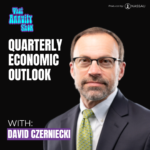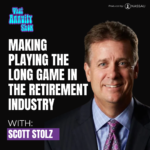Retirement plan hardship withdrawals are increasingly prevalent throughout the U.S. in recent years, with multiple reasons for the trend.
According to data from Vanguard Group, more Americans took retirement withdrawals in the last quarter of 2022. In fact, hardship withdrawals from 401(k) plans reached an all-time high in October 2022.
Retirement savings experts cite high inflation, rising credit card debt and lack of savings for the shift toward higher 401(k) plan withdrawal activity.
“Retirement plan withdrawals make sense when there is no other reasonable option available, such as when money is needed for an emergency expense,” says Michael Collins, chartered financial analyst and professor at Endicott College in Beverly, Massachusetts. “Hardship withdrawals are also an option for those experiencing an immediate and heavy financial burden, such as job loss, illness or disability.”
Before you raid your 401(k) or IRA for early cash, get to know the realities – and the benefits – of taking out a retirement plan hardship loan.
401(k) Loan vs. Retirement Plan Hardship Loan
Retirement plan withdrawals are different from 401(k) loans, and plan participants should know the difference before taking money out.
Finding the right financial advisor that fits your needs doesn’t have to be hard. SmartAsset’s free tool matches you with top fiduciary financial advisors in your area in 5 minutes. Each advisor has been vetted by SmartAsset and is legally bound to act in your best interests. If you’re ready to be matched with local advisors that will help you achieve your financial goals, get started now.
“Retirement plan withdrawals are when money is taken from the plan in order to cover a financial hardship, such as medical expenses, funeral costs, higher education expenses, home repairs, purchase of a primary residence or to prevent eviction or foreclosure,” Collins says. “401(k) loans are taken from an investor’s account and paid back with interest over a period of time.”
High loan costs. The main downside of taking out retirement plan savings from 401(k)s and IRAs is that, in doing so, savers are grabbing cash from their retirement-bound future selves.
“First of all, you’ll pay an effectively huge fee to tap into your account – usually 10% plus federal and state taxes,” says Paul Tyler, chief marketing officer of Nassau Financial Group in Hartford, Connecticut. “Second, you’ll lose the long-term compounding effect of every dollar you pull out of your account.”
For example, take a retirement savings account that grows at a modest 6% over a 20-year period. “Withdrawing even $100 is really like taking over $320 from your future self,” Tyler says.
It gets worse the earlier you take out the loan. “A $10,000 hardship distribution for an employee in the 25% tax bracket would pay $3,500 in taxes and penalties,” says Greg Mykytyn, senior vice president at Commerce Street Peak Advisors in Dallas. “A 35-year-old taking a $10,000 hardship distribution would reduce their retirement savings by $110,000 assuming an 8% rate of return.”
That’s not the goal with 401(k) plan savings. “They’re designed savings to create your income in retirement, not reduce it,” Mykytyn notes.
401k Hardship Withdrawal Reasons
Real life has a way of intruding on personal money management issues, and there are instances when a hardship retirement plan withdrawal may be justified. These household financial scenarios fall into that category.
1. Medical Emergencies
When do retirement plan withdrawals make sense? Start with medical costs.
“There are situations where the need to get money to cover a short-term financial emergency is stronger than the need to contribute to your long-term financial health,” says Megan Yost, senior vice president and retirement plan engagement strategist at Segal Benz, the communications division of Segal, a human resources and benefits consulting firm. “For example, medical care expenses for yourself or a loved one or housing payments necessary to prevent eviction.”
2. Home Repairs
If your home is damaged in a natural disaster such as a hurricane or tornado and you don’t have the funds to cover the repairs, a hardship withdrawal may be necessary.
“However, it’s important to explore other options such as disaster relief programs or loans before tapping into your retirement savings,” advises Glen Hedrick, a financial advisor at Old North State Wealth Management in Wilmington, North Carolina.
3. Eviction or Foreclosure
If you’re facing eviction or foreclosure and you don’t have the funds to catch up on payments, a hardship withdrawal may be necessary.
“Try exploring other options, such as loan modification or refinancing, before tapping into your retirement savings,” Hedrick says.
4. Funeral Expenses
If you have an unexpected death in the family and you don’t have the funds to cover the funeral expenses, a hardship withdrawal may be necessary.
“Examine other options, such as life insurance or personal loans, before tapping into your retirement savings,” Hedrick adds.
Use Loans as a Last Resort
A retirement plan withdrawal before age 59 1/2 should be a last resort.
“You want to make sure that you have exhausted all other alternatives first,” says Kendall Meade, a certified financial planner with SoFi, in San Francisco. “It may make sense if you have exhausted all other options and are unable to keep up with your essential bills.”
Early Retirement Savings Plan Withdrawals: The Bottom Line
As part of the SECURE Act 2.0 legislation passed last December, Congress included a provision allowing Americans to pull up to $1,000 from their 401(k) or IRA tax-penalty free.
That doesn’t mean you should make raking cash out of your retirement account a regular pastime. “Talk to a financial advisor before you make any decisions about how to handle a financial emergency,” Yost advises. “Many employers offer free financial advice as part of their benefits. And don’t be shy about asking if the financial advisor is a fiduciary, which means they’re obligated to keep your best interest in mind.”
Additionally, many employers have started offering a broader range of benefits to help people manage both their short- and long-term financial needs.
“Employees should explore the benefits that are available to them through their workplace, including financial counseling and advice,” Yost adds. “Still, a financial advisor can best help you make personalized decisions about the best ways to access cash in an emergency with the least negative consequences to your overall financial situation.”
Receive Updates
Show Sponsors
The discussion is not meant to provide any legal, tax, or investment advice with respect to the purchase of an insurance product. A comprehensive evaluation of a consumer’s needs and financial situation should always occur in order to help determine if an insurance product may be appropriate for each unique situation.
 That Annuity Show
That Annuity Show

















Recent Comments